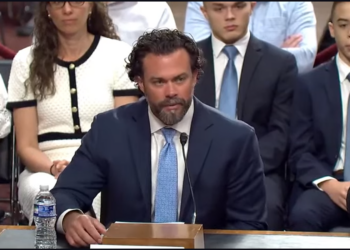Western countries are urging Israel to do more to prevent unnecessary starvation in Gaza, while Arab and Muslim countries have called on Hamas to disarm and relinquish power.
The war between Israel and Hamas has gone on for nearly 22 months. The Israeli military has left a significant majority of Gaza flattened, displaced almost all of the population, killed about 60,000 combined terrorists and civilians, and has prevented necessary amounts of medical and humanitarian aid from entering the strip to the point that there have been Palestinians starving to death.
The distressing images out of Gaza in recent weeks, showing the emaciated civilian population desperate for food and clean water, have seemingly led government leaders from across the globe to put new pressure on both Israel and Hamas to do what’s necessary to end the suffering.
For the first time since the war began, the 22-member Arab League, the entire European Union, and another 17 countries backed a declaration signed at a United Nations conference in New York on Tuesday that called for Hamas to give up power in the Gaza Strip.
Despite United States criticism of the conference, the joint document said, “Governance, law enforcement and security across all Palestinian territory must lie solely with the Palestinian Authority,” and it added, “in the context of ending the war in Gaza, Hamas must end its rule in Gaza and hand over its weapons to the Palestinian Authority, with international engagement and support, in line with the objective of a sovereign and independent Palestinian State.”
But, there have yet to be any signs from Hamas that they would be willing to give up power in Gaza.
The document also condemned Hamas’s Oct. 7, 2023, attack, which instigated the current war.
It called for the deployment of “a temporary international stabilization mission” upon invitation by the Palestinian Authority.
In addition to the joint document, United Kingdom Prime Minister Keir Starmer and French President Emmanuel Macron announced recently that they could recognize Palestinian statehood as soon as this fall.
In the case of Starmer, he specifically said the U.K. would recognize Palestinian sovereignty unless Israel met specific steps he laid out. Still, he did not verbalize what would happen if Israel made good on those demands, but Hamas does not follow through with his condition that they demilitarize.
“I understand the impulse, but I think in both Macron and Starmer’s cases, this is virtue signaling. They have no influence whatsoever on the current problems in Gaza and they’re not going to have any influence on changing the conditions that Starmer laid out, that would in September allow him to stand down from recognition because this was a conditional recognition the Israeli government will not accept,” Aaron David Miller, a longtime Middle East analyst who now serves as a senior fellow for the Carnegie Endowment for International Peace, told the Washington Examiner.
Miller, who served for decades in the State Department and was involved in the 2000 Camp David Summit that took place 25 years ago this month, said “the gaps between Israelis and Palestinians 25 years ago were as wide as the Grand Canyon,” but now, in 2025 and after Oct. 7 attack and the ensuing war, the gaps are “profoundly and galactically greater.”
“Right now and for the foreseeable future, [a two-state solution is] tethered to a galaxy far, far away, not to the realities back on planet earth,” he continued.
Israeli officials have said for many months that recognizing Palestinian statehood, especially before the removal of Hamas from the governing institution in charge of Gaza, would be rewarding them for the Oct. 7 attack and raising concerns about future attacks on Israel.
The Trump administration has said that both efforts, the U.N. conference and conversations about Palestinian statehood, are unhelpful to getting a deal to end the war completed.
President Donald Trump has distanced himself from Starmer’s announcement, but he also disputed Israeli Prime Minister Benjamin Netanyahu’s comments disputing the overwhelming humanitarian crisis in the Gaza Strip.
HOW ISRAEL-GAZA CONFLICT ARRIVED AT INFLECTION POINT
“They need food, and they need people to be able to get them the food,” Trump said earlier this week. He announced that the U.S. would be involved in setting up new food centers, though the details of this effort remain unclear.
Daniel Samet, a visiting fellow with the American Enterprise Institute, told the Washington Examiner, “The Trump administration should keep disavowing foolish attempts by European capitals to conjure a Palestinian state. It’s siding with Israel because it knows that the Palestinians do not meet the conditions for statehood. Israel must win this war and eject Hamas before Gaza can be rebuilt and a brighter future for Gazans secured. Many in Europe and the Middle East will the ends but not the means.”
Trump has remained between the two extremes, Miller argued, not giving Netanyahu “a blanket endorsement of an Israeli campaign at permanent occupation in Gaza,” or on the other end of the spectrum, pushing for an “all-for-all deal to end the war.”
The Integrated Food Security Phase Classification, a leading expert on food crises, issued a new alert on Tuesday stating that the worst-case scenario of famine is playing out in the Gaza Strip.
















